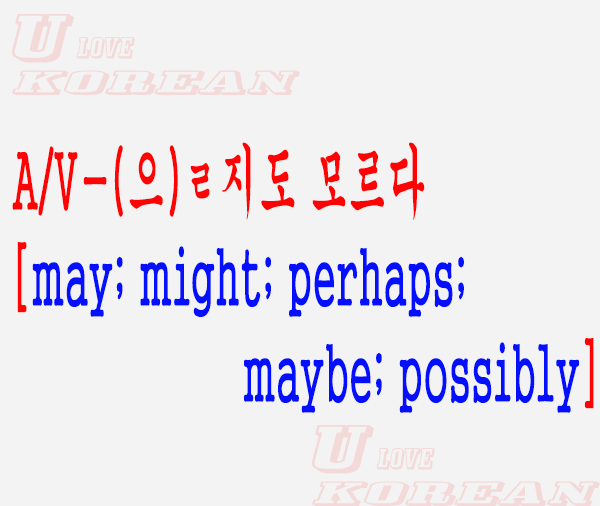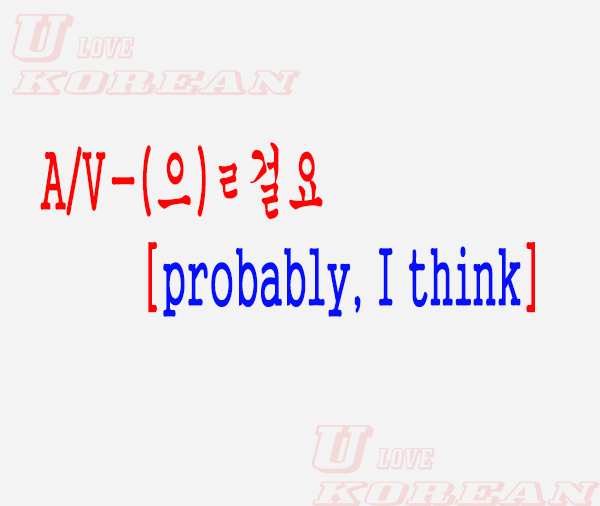Featured Posts
 A/V-(으)ㄹ지도 모르다
A/V-(으)ㄹ지도 모르다
1. Usage :
- Express a guess or not sure that something might or likely to happen. = may; might;perhaps; maybe; possibly etc.
- It is incorrect to change 모르다 to 몰랐다 in the past tense form.
- (으)ㄹ 수도 있다 is similar to -(으)ㄹ지도 모르다
21.08.2023 | KOREAN SKILL | 0 Comments
 A/V-(으)ㄹ걸요
A/V-(으)ㄹ걸요
- An expression used to indicate that the content of the preceding statement is the speaker’s opinion or guess = probably, I think, I bet
- A sentence-final ending used to indicate a guess or assumption
- Only use when speaker is privy to the information - if both people know the same information, can’t use it.
- weaker conviction than ~(으)ㄹ 거예요.
20.08.2023 | KOREAN SKILL | 0 Comments
 (으)느/는/(ㅇ)ㄹ 줄(을) 알다/모르다
(으)느/는/(ㅇ)ㄹ 줄(을) 알다/모르다
1. Usage:
1- (으)ㄴ/는/(으)ㄹ 줄 몰랐다 : Expresses things that the speaker does not know or anticipate.
2- (으)ㄴ/는/(으)ㄹ 줄 알았다 : Expresses the speaker thinking, thinking, knowing that it is so but really is not.
3- They are –(으)ㄹ 줄(을) 알다/모르다 “know/ don’t know how to do something”
21.08.2023 | KOREAN SKILL | 0 Comments
 N(이)네요 / VA네요
N(이)네요 / VA네요
– 네요 is attached to a verb, an adjective and ‘noun+이다’. It is an exclamatory ending that expresses surprise or exclamation at the moment when the speaker is talking about something.
- When agreeing with something said by someone else.
- It corresponds to ‘really’, ‘certainly’, ‘wow’ in English.
04.09.2023 | KOREAN SKILL | 0 Comments
 A/V-(으)ㄴ/는 모양이다
A/V-(으)ㄴ/는 모양이다
1. Detail Explanation :
1) An expression used to guess that something is in progress or in a certain state, considering another fact or situation. This grammar pattern is used to infer or guess a situation after observation. About things that you can see or hear. It is to be kept in mind that it is not used for talking about yourself.
23.08.2023 | KOREAN SKILL | 0 Comments
 V/A -(으)ㄹ 거예요
V/A -(으)ㄹ 거예요
- “V-(으)ㄹ 거예요” is used to express a future plan or intention and means the same as ‘will’ or ‘is going to’ in Enlist.
27.08.2023 | KOREAN SKILL | 0 Comments
 V-다가
V-다가
- V~다가 is used to indicate the speaker's interruption of any action to immediately start doing another action.
- V~다가 can be equivalent to (while)....and/but then in English.
12.09.2023 | KOREAN SKILL | 0 Comments
 기 때문에
기 때문에
– 기 때문에 is attached to a verb, an adjective and ‘noun+이다’, indicating a reason or a cause for an action or a situation.
- 기 때문에 which means “because/so” in English.
- 기 때문에 is used when expressing a clear reason and is a more literary expression than -아/어서 and (으)니까.
08.09.2023 | KOREAN SKILL | 0 Comments
 N 전에, V-기 전에
N 전에, V-기 전에
1. Detail Explanation
- " Verb + 기 전에 " is used when the speaker wants to express something 'before a certain time or action.'
- N 전에/V-기 전에 has the meaning of "before a certain period of time" or "before some action". It basically corresponds to "before" or "ago" in English.
24.08.2023 | KOREAN SKILL | 0 Comments
 A/V-았/었/였어요
A/V-았/었/였어요
“-았/었/였어요”. The rule is the same as the present tense.
It is always use with family members or friends
In declarative form : V/A-았/었어요
In Interrogative form : V/A-았/었어요?
28.08.2023 | KOREAN SKILL | 0 Comments
 A/V-(으)ㄹ지도 모르다
A/V-(으)ㄹ지도 모르다